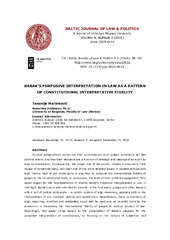Barak's Purposive Interpretation in Law as a Pattern of Constitutional Interpretative Fidelity
2016
Preuzimanje 🢃
Članak u časopisu (Objavljena verzija)
Metapodaci
Prikaz svih podataka o dokumentuApstrakt
Political jurisprudence points out that constitutional court judges sometimes act like political actors, and that their decisions are a function of strategic and ideological as much as legal considerations. Consequently, the proper role of the courts, notably in exercising their review of constitutionality, has been one of the most debated issues in modern political and legal theory. Part of the controversy is also how to measure the interpretative fidelity of judges to the constitutional texts, or conversely, the level of their political engagement. This paper argues for the reconsideration of Aharon Barak's Purposive Interpretation in Law in that light. Barak's work was intended to provide, in the first place, judges and other lawyers with a sort of judicial philosophy - a holistic system of legal reasoning, applying both to the interpretation of will, contract, statute and constitution. Nevertheless, these conventions of legal reasoning, modified and readapted, could well be used al...so as heuristic tools by the academics in measuring the interpretative fidelity of judges to various sources of law. Accordingly, this paper clings closely to the presentation of Barak's precepts for the purposive interpretation of constitutions, by focusing on the notions of subjective and objective purpose in interpreting constitutions, and how the potential conflicts between these purposes are resolved.
Izvor:
Baltic Journal of Law and Politics, 2016, 9, 2, 85-101Institucija/grupa
Pravni fakultet / Faculty of Law University of BelgradeTY - JOUR AU - Marinković, Tanasije PY - 2016 UR - https://ralf.ius.bg.ac.rs/handle/123456789/896 AB - Political jurisprudence points out that constitutional court judges sometimes act like political actors, and that their decisions are a function of strategic and ideological as much as legal considerations. Consequently, the proper role of the courts, notably in exercising their review of constitutionality, has been one of the most debated issues in modern political and legal theory. Part of the controversy is also how to measure the interpretative fidelity of judges to the constitutional texts, or conversely, the level of their political engagement. This paper argues for the reconsideration of Aharon Barak's Purposive Interpretation in Law in that light. Barak's work was intended to provide, in the first place, judges and other lawyers with a sort of judicial philosophy - a holistic system of legal reasoning, applying both to the interpretation of will, contract, statute and constitution. Nevertheless, these conventions of legal reasoning, modified and readapted, could well be used also as heuristic tools by the academics in measuring the interpretative fidelity of judges to various sources of law. Accordingly, this paper clings closely to the presentation of Barak's precepts for the purposive interpretation of constitutions, by focusing on the notions of subjective and objective purpose in interpreting constitutions, and how the potential conflicts between these purposes are resolved. T2 - Baltic Journal of Law and Politics T1 - Barak's Purposive Interpretation in Law as a Pattern of Constitutional Interpretative Fidelity EP - 101 IS - 2 SP - 85 VL - 9 DO - 10.1515/bjlp-2016-0013 UR - conv_3377 ER -
@article{
author = "Marinković, Tanasije",
year = "2016",
abstract = "Political jurisprudence points out that constitutional court judges sometimes act like political actors, and that their decisions are a function of strategic and ideological as much as legal considerations. Consequently, the proper role of the courts, notably in exercising their review of constitutionality, has been one of the most debated issues in modern political and legal theory. Part of the controversy is also how to measure the interpretative fidelity of judges to the constitutional texts, or conversely, the level of their political engagement. This paper argues for the reconsideration of Aharon Barak's Purposive Interpretation in Law in that light. Barak's work was intended to provide, in the first place, judges and other lawyers with a sort of judicial philosophy - a holistic system of legal reasoning, applying both to the interpretation of will, contract, statute and constitution. Nevertheless, these conventions of legal reasoning, modified and readapted, could well be used also as heuristic tools by the academics in measuring the interpretative fidelity of judges to various sources of law. Accordingly, this paper clings closely to the presentation of Barak's precepts for the purposive interpretation of constitutions, by focusing on the notions of subjective and objective purpose in interpreting constitutions, and how the potential conflicts between these purposes are resolved.",
journal = "Baltic Journal of Law and Politics",
title = "Barak's Purposive Interpretation in Law as a Pattern of Constitutional Interpretative Fidelity",
pages = "101-85",
number = "2",
volume = "9",
doi = "10.1515/bjlp-2016-0013",
url = "conv_3377"
}
Marinković, T.. (2016). Barak's Purposive Interpretation in Law as a Pattern of Constitutional Interpretative Fidelity. in Baltic Journal of Law and Politics, 9(2), 85-101. https://doi.org/10.1515/bjlp-2016-0013 conv_3377
Marinković T. Barak's Purposive Interpretation in Law as a Pattern of Constitutional Interpretative Fidelity. in Baltic Journal of Law and Politics. 2016;9(2):85-101. doi:10.1515/bjlp-2016-0013 conv_3377 .
Marinković, Tanasije, "Barak's Purposive Interpretation in Law as a Pattern of Constitutional Interpretative Fidelity" in Baltic Journal of Law and Politics, 9, no. 2 (2016):85-101, https://doi.org/10.1515/bjlp-2016-0013 ., conv_3377 .



